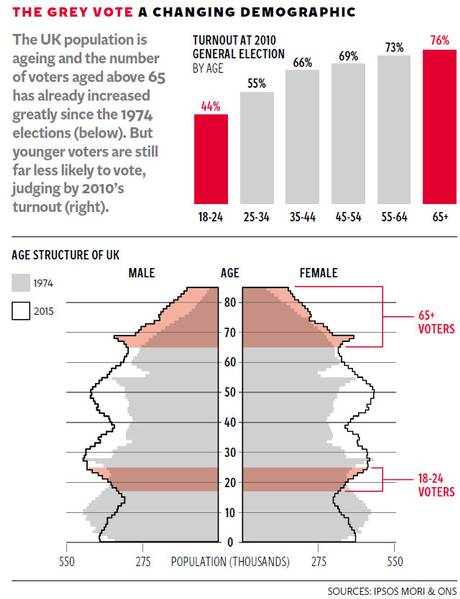This May, the UK goes to the polls in what is set to be the closest election in decades, with all predictions pointing towards another hung parliament. In such an unpredictable election, the voices of students need to be heard more than ever. Voting this May can change the way our country is run – here’s why.
(Source: http://www.independent.co.uk/news/uk/labour-mp-sadiq-khan-admits-young-people-are-neglected-by-politicians-9956943.html)
You should vote to move issues that affect you, and young people, up the political agenda. Politicians ignore the demands of young people because they don’t vote. The graph above highlights just how many over-sixties vote, in comparison with the under 25s. Politicians can rely on the over-sixties to turn out in their droves, and it is therefore little wonder that their policies are often so tailored towards the ‘silver vote’. It’s no coincidence that politicians, of all parties, frequently propose cutting housing benefits for under 25s but will never touch bus passes for pensioners, even the millionaires. Sadiq Khan, the Shadow Justice Secretary, identified this problem himself, claiming that this election risked being ‘skewed towards the interests of the elderly unless more young people could be encouraged to vote’. Politicians aren’t going to start listening to young people unless that 44% increases significantly.
You should vote because you are a powerful enough group to swing constituencies. A HEPI study identifies 10 constituencies in which the student vote could alter the outcome of the election. In Bristol West, 24% of the population are students (2011 census), and, even though their MP, Stephen Williams, was elected with 11,000 more votes than his nearest rival, the votes of students look set to help Labour and the Green Party challenge for this seat. The Lib Dems are learning the perils of betraying students, with the proportion of students voting for them set to drop from 44% in 2010 to 13% or lower in 2015. Even in Nick Clegg’s own seat of Sheffield Hallam, where students make up 17% of the population, Labour look set to provide a robust challenge to the Lib Dems.
Thanks to our antiquated political system, there are a large number of ‘safe’ seats across the country, where inability to affect the outcome disengages students and non-students alike. Voting is still crucial in these seats. As the election is set to be so close this year, national voting figures really matter. The Greens and UKIP could easily outpoll the Lib Dems, but occupy less than 5 seats between them. The greater this disparity between votes and seats, the more likely it is that a conversation about electoral reform will be back on the table.
Furthermore, you should vote because it is your responsibility to do so. If you don’t vote, you’re not only doing a disservice to the suffragettes and Trade Union movements who campaigned for your right to do so at the start of the twentieth century, you’re also sacrificing your right to complain about anything you don’t like about how the country is being run. Voting is your chance to change things. Not doing so is a missed opportunity.
Feeling inspired? Your first step is registering. Next, work out who to vote for. This is a great tool to help match up your beliefs with those of the major political parties (yes, including the Greens) – though in some constituencies you might want to consider voting tactically. Find out who’s contending in your constituency here. You should also take a look at this excellent NUS New Deal Manifesto for the 2015 Election. You might also want to campaign in May – if your Uni doesn’t have a society or group that reflects your political interests, join up with a local political party and campaign with them.
At Student Hubs, we believe students have the power and potential to shape a better world. The General Election is an opportunity for you to do just that – don’t waste it.

